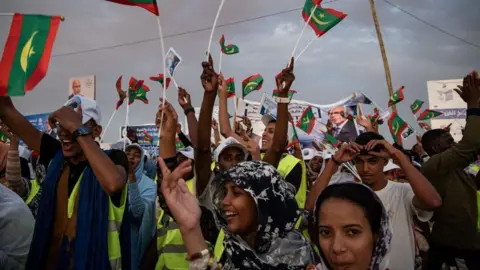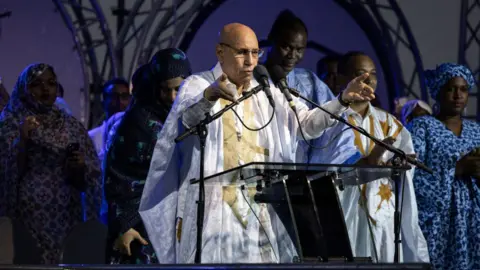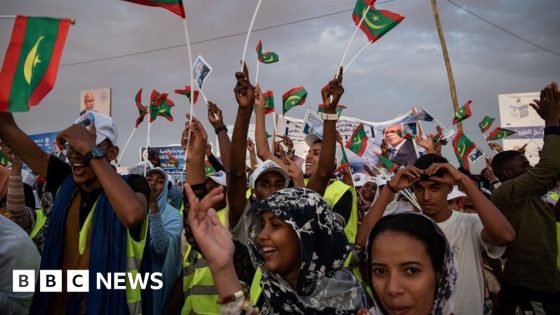By Aaron Akinyemi & Danai Nesta Kupemba, BBC News
 AFP
AFPAs Mauritanians head to the polls in the presidential election, the country faces a multitude of issues including a legacy of military coups, migration, jihadist attacks in neighbouring countries and a harrowing legacy of slavery.
President Mohamed ould Cheikh Ghazouani, who has been in power since the country’s first democratic transition in 2019, is seeking a second and final term.
Six other candidates are challenging him for the top job.
This election is a litmus test of Mauritania’s burgeoning democracy and an indicator of how well it is progressing on its path to greater political openness.
When former President Mohamed ould Abdel Aziz stepped down in 2019 after his tenure, it heralded a new era for a country that had endured multiple military coups and authoritarian rule.
“Mauritania has the strongest democratic credentials in the Sahel at present, which given its history of coups is quite surprising,” Joseph Hammond, iDove Fellow at the African Union, told the BBC.
One of those hoping to be Mauritania’s next leader is Biram ould Dah ould Abeid, who came second in the 2019 elections.
Mr Abeid’s grandparents were slaves and he has spent much of his life campaigning against the practice.
He has been arrested and imprisoned over the years because of his work as president of the Initiative for the Resurgence of the Abolitionist Movement (IRA).
Slavery remains a sensitive issue in Mauritania, which was the last country in the world to outlaw slavery, in 1981.
“My father fought against pro-slavery all his life. I swore to my father that I would fight without ever compromising. I would fight slavery and those who support it,” Mr Abeid told the BBC in 2016.
It has been abolished in the country three times, but thousands of black Mauritanians still live as unpaid domestic servants, while anti-slavery activists face repression.
An estimated 149,000 people are enslaved in Mauritania – about 3% of the population, according to the Global Slavery Index (GSI) in 2023.
 AFP
AFPMigration is another hot topic issue that will be on voters’ minds as they head to the polls.
Mauritania is a key transit point for migrants trying to reach Europe from West Africa, with thousands of boats departing from the country last year.
In April, the European Union granted Mauritania €210m (£177m; $225m) in aid – almost €60m of which will be invested in the fight against illegal immigration to Europe.
Corruption also continues to be a major problem in Mauritania.
Former President Aziz was jailed for five years for illicit enrichment and embezzlement and is disqualified from standing in the election.
The country is rich in various natural resources like iron, gold, phosphate and is an upcoming market in the oil sector in Africa, yet almost 59% of the population lives in poverty, according to the United Nations.
It also has huge potential in renewable energy – particularly green hydrogen. This form of energy could eventually provide a cleaner alternative to fossil fuels and play a role in the country’s carbon-free energy transition.
Investors from Europe, Asia, and the Middle East, particularly the United Arab Emirates, aim to make Mauritania an energy hub for green hydrogen production, according to the Africa Center for Strategic Studies.
President Ghazouani has also campaigned on the importance of the country’s security.
Mauritania is in the Sahel region, the semi-arid strip of land south of the Sahara desert, which is a hotbed of jihadist activity, but the country has been generally free of attacks since 2011.
Its neighbour, Mali, however continues to struggle with repeated jihadist attacks.
Analysts have partially credited President Ghazouani, whose long career in the army and security services has given him a deep understanding of the jihadist challenges facing the Sahel region.
President Ghazouani has developed a close alliance with Western partners like France and the US, but has also been careful to keep ties with its military-run neighbours like Mali, Burkina Faso and Niger, who have shunned Western influence recently, reports the AFP news agency.
Head of the US Africa Command, Gen Michael Langley, said Mauritania has had a “longstanding” role in countering terrorism and preventing violent extremism in the Sahel.
Cheikhani Khlil, communication professor at Mauritania’s Lebanese International University, told the BBC President Ghazouani has allied Mauritania with the US to combat the attacks.
“There is continued training conducted by US special forces for Mauritanian special forces units to secure national borders, which reinforces the tactical capabilities and combat readiness of our armed forces,” he said.
Analysts say that as an important player in regional security, Mauritania’s ability to continue this leadership role depends to a significant extent on an effective and peaceful transfer of power that leads to a stable government.
More BBC stories about the crisis in the Sahel:
 Getty Images/BBC
Getty Images/BBC
Source Agencies




